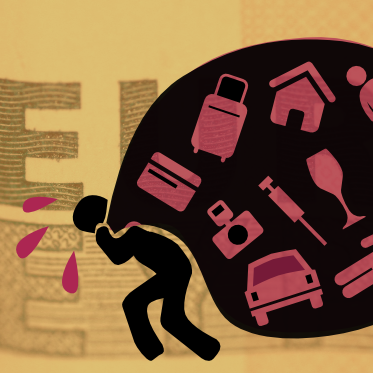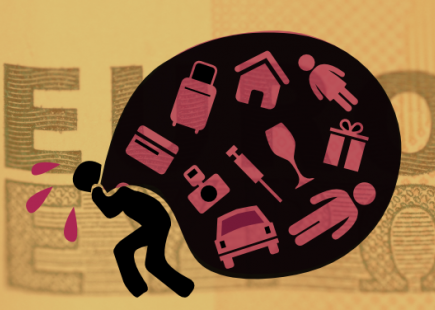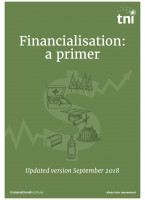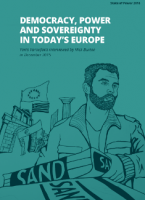On financialisation, exit options for capital and sites of resistance Daniel Chavez talks with Ewald Engelen
Topics

Tessa Kersten-Zenger using work by Gan Khoon Lay

Tessa Kersten-Zenger using work by Gan Khoon Lay
What is the real significance of money in European and global politics today?
That’s a big question. I wouldn’t so much zoom in on money as on finance. One thing that is pretty striking, if you look back at the history of global capitalism of the last 40 to 50 years, is the increasing importance of finance all over the place. Not only banks, but also asset managers, financial markets, financial instruments, financial logics, financial expertise and financial professionals. They have penetrated all spheres of social life, infusing those fears of social life with concerns that are predominantly financial. And we, citizens, have increasingly been socialised to think of ourselves also as financialised subjects. That is one of the most striking developments of the last 30, 40 or 50 years, depending on where you’re located.
How would you explain to ordinary people, to non-academics, the concept of financialisation, which sounds so complex and difficult to understand?
Yes, it does sounds complex, but actually it’s pretty simple. Political elites have embarked upon a project of increasing neoliberalisation of societies and economies. One outcome of that has been the withdrawal of public, social and collective provision, which provided citizens with security, and instead they have replaced that with financial markets. So, in the late 1970s, in The Netherlands, a country in Western Europe with a well-developed welfare state, almost seventy percent of Dutch households rented their house, with social housing provided by state-backed cooperatives. Fast-forward, 40 years later, fifty-five percent of Dutch households own their own house, and of course a house is too expensive to pay for from your own savings, so the consequence has been 30-year mortgage loans with fluctuating interest rates, transforming the house from something that you live in, with use value, into something that has a speculative value, market value. That is financialisation in a nutshell.
At recent conferences you have highlighted the emergence of multiple and potential sites of resistance to financialisation. What do you mean, in concrete terms?
These are two questions, one focused on multiplicity and the other on potentiality. The question of multiplicity is important, because I think we have a tendency to come up with very technical solutions to the great financial crisis that exploded between 2007 and 2008, and those technical solutions range from higher equity buffers for banks and breaking up banks, reinstating Glass–Steagall type legislation, to more radical full reserve banking, for instance.
But it’s all about a single silver bullet which is going to do the trick, and I think – politically speaking, but also in terms of effectiveness – that that is a mistake, and that we should think about finance and financialisation as something that is multi-layered and has multiple means of attack on social economic life. And, if you take that particular perspective seriously, then you can transform these into potential sites of resistance.
Some of these sites have already been transformed into sites of resistance. Around (tax) evasion, around TTIP, with people who try to set up cooperatives and mutualities, looking for peer-to-peer lending… We see ways of resisting the dominant modes of financialisation, but other sites have not yet been transformed into sites of resistance. For instance, around the whole issue of social housing; it is still seen as a good thing to extend and facilitate the furthering of owner-occupied housing in general, whilst actually we should strive for a reassessment of the importance of having good social housing accessible for everyone.
Here in Amsterdam, there is an organisation called Fair City, with branches in other parts of Europe, which is basically about trying to answer the questions of who owns the city, for whom is the city. Increasingly, cities, especially cities that see themselves as successful, are exclusively owned by the rich and the middle class of guys and girls who were able to buy property. And the city, of course, should be for a much wider set of citizens; also those citizens who can’t buy property, as they too have a right to the city. So, the city’s increasingly being transformed into a site of resistance, but not yet to its full extent.
You have also said that you’re unaware of political subjects able or willing to turn the opposition to financialisation into a political project, and that there’s no party or programme trying to integrate all these potential sites of resistance into a political platform. What about new parties like Podemos, or mayors like Ada Colau in Barcelona, who are trying to incorporate these issues into their political agenda?
Absolutely, you’re right. Basically, I believe that every organisation or every political movement that tries to occupy even only one site of potential resistance needs to be applauded, because that’s where it all should start, but at the end of the day I think it is important to have some awareness of what the overall agenda is or should be.
From my perspective, this should be to counter the huge extent to which capital has been able to capture political democratic decision-making and transform the world into a place where corporations have rights without responsibilities, in which they have mobility options without any sort of awareness of the need to compensate social wrongs. So, that larger programme should be developed so as to link all those different sites of resistance together and turn that into a wider global movement.
Ada Colau comes from a particular movement, which resisted the evictions of families from their houses when they could no longer afford to pay their mortgages, so she reflects a particular and very specific site of resistance, which has been scaled up and has taken her into the mayoral house of Barcelona, which is certainly a good thing, but I’m not aware of the extent to which they have actually used countering financialisation as some sort of a political slogan which is connected to a wider political programme. And that’s what we should be striving for.
You argue that there is no silver bullet against financialisation. But can ordinary people, local communities or even the state do anything to reclaim and democratise the financial architecture? Is there any possibility of restructuring the banking system, the tax structure or public budgets, to start moving into some sort of real change?
Yes, I do think people can do something to promote real change. Not in the sense that would allow us right now to develop those more specific policy proposals that need to be put on the table. But what I find quite inspiring is that people have increasingly become aware of the fact that multinational corporations do not pay any taxes, and they do see that as unfair and unjust, and they are willing to come up with all sorts of activist strategies to counter that, and are increasingly putting pressure on mainstream political parties, politicians and policy-makers to counter the power of finance.
Of course, this is a topic that touches the heart of what capitalism is all about, so the defences of capital are obviously well organised and have quite a lot of resources available, but this is -- in my opinion -- the first time we have the chance to construct a wider movement against unfair, unjust tax evasion. This could be used to lever up the movement and bring it forward, towards what I would like to see as a wider political programme against financialisation.
And a similar story can be told in relation to CETA, TISA and TTIP, as people increasingly see through the narrative that has been told to them by the elites, about the beneficial aspects of those free trade agreements that will not be delivered. Citizens are more aware of the downsides of trade and the huge imbalances in terms of power resources between capital, on the one hand, and labour, on the other hand. That is an enormous eye-opener for a large number of people who have never been radical and have never associated themselves with a radical or progressive political economy, and who now perceive this as being unfair and unjust.
All this could be used to push people towards a wider political programme, which should be about countering financialisation.
Moving to Europe, what is your interpretation about the current state of debate on financial planning. For instance, what do you think about the five presidents’ report?
You and I just came back from a conference in London [Beyond the Zombie Economy: Building a Common Agenda for Change] where there was a lot of discussion about the future financial crisis and its potential impacts, in particular in Europe. And I found it amazing that, from the perspective of many activists and researchers, it is still seen as a force for good, as a force for progressive legislation that fulfils a nice social liberal image. And what is quite striking – and this has become clearly visible in the last couple of years, especially in its treatment of countries like Ireland, Greece and Portugal – is that Europe has become, in fact, very much a neoliberal project.
What we’ve now witnessed, in the last eight years, is the constitutionalisation of ordo-liberal precepts with regard to how the market or the market economy should be managed, with limited state interference, reduction of state debts, and basically redrawing the boundaries between the welfare state and the market in such a way that only simple services are being delivered. Privatisation all over the place, that’s basically the agenda, and that raises awkward questions about how to to deal with the European Union.
Neoliberalism in Europe is clearly visible when you look at the five presidents’ report, which in my opinion is all about a further federalisation of sovereignty in the European Union realm. At the end of the day, this means that you construct all sorts of jurisdictional prerogatives in the hands of institutions that are completely out of democratic control.
The European Union is working in a democratic vacuum, which means that once the proposed steps have been set there’s no way whatsoever that normal average citizens could contest neoliberal policies. In a sense, this means creating a corporate paradise, because corporations are extremely well connected to policy-makers in European institutions. Brussels is a lobby Valhalla, just like Washington, and that’s basically what the five presidents’ report is all about. It tries to set up a political union for a fiscal union, a financial markets union.
The current policies, which were initiated by Jonathan Hill, a former lobbyist in the City of London, are fundamentally, once again, about the deregulation of financial markets. A couple of examples… very briefly, the attempt is again to set up a European unified market for repackaging mortgage products, the very same products that are at the root not only of the American financial crisis, but also the European home-grown financial crisis. That’s one, and the second issue refers to a recent article in the Financial Times, which takes a look at the regulatory obstacles which hedge funds located in Mayfair London encounter when they sell their overrated and highly expensive asset management services in the rest of Europe. This is a deregulatory agenda, which comes eight years after a financial and economic crisis which arguably has been the largest and worst economic crisis since the 1930s. This is flabbergasting!
I’m glad you said that Europe is not what we used to think about Europe, because I’d like to pose a question about Europe and the South. Much of the left in the South, in particular in Latin America, tends to see the United States government as the source of all evil and Brussels as a benign power. How do you interpret this perception?
I think that perception is a misperception, and of course I can easily understand why this idea has come about, as it has everything to do with the militaristic and imperialist policies that have been pursued by the United States in Latin America, which they perceive to be their backyard. Europe has not undertaken those particular kinds of interventions, but in terms of economic policies I would say that the differences between the United States and the European Union are not that large. It’s all about constructing a legal framework that would allow multinational corporations excessive leeway in terms of where they want to undertake their activities and how much tax they want to pay, because today it’s basically voluntary taxation for multinational corporations, with excessive leeway to avoid what they see as uncompetitive regulatory measures.
In that sense, it’s the same for Brussels and Washington. Brussels is a lobbying Valhalla that has nothing to do with democracy, since it reproduces and even increases the massive power resource imbalances between the average citizen and multinational corporations, which are now constructing an even larger common and transatlantic market with the explicit geopolitical aim of excluding third parties. CETA and TTIP are not going to be beneficial for producers or consumers in Latin America or anywhere else in the South whatsoever.
I can imagine that with regard to the restart of negotiations with the Mercosur, it will be much more about the issue of tariffs, whereas in the negotiations with the United States is not about tariffs, because there are no tariffs in place any longer, or just in limited areas, so it’s all about market harmonisation. But at the end of the day, the effects will be the same, because the idea is to provide exit options for capital. And this, in my opinion, is at the root of what is wrong with contemporary capitalism, which basically boils down to a further increase in inequality with regard to the power resources of labour and capital.
Any free trade agreement enhances the exit options of capital, because labour, for all sorts of reasons – social, cultural or political reasons – tends to stay stuck in particular communities, since there’s only a very small small slice of a national population that migrates on a year-to-year basis. So, for all these sociological reasons labour is immobile, whereas capital has become increasingly mobile, and that creates the power imbalances that are going to be furthered by these free trade agreements.
Focusing on labour, why do you think at our recent conference in London participants engaged in such a passionate exchange about the meaning and relevance of bonded labour, which is a concept that hardly appears in political and academic discussions?
It has to do with financialisation. I talked about average citizens increasingly becoming dependent upon the services provided by the financial sector, both in terms of payments of their loans as in terms of their savings, which are controlled by professional asset managers. In both instances this actually means that for an increasing slice of the working day, workers are actually working at the service of their banks. If you own a house, most of the time that is connected to a loan, and you have to work in order to be able to pay off the the principal sum as well as the interest.
In a Dutch setting that would mean that one day in a five-day working week you’re basically working for your bank, which suggests a new post-modern and post-democratic financialised form of debt bondage. And that’s increasing, especially if you see it’s not only for the ability to buy a house that you’re dependent on financial markets, but also increasingly to gain access to higher education or using your credit card in order to overcome temporary periods of unemployment. So, for all sorts of services which used to be provided for by the welfare state, you are dependent on financial markets, which means that you work to an increasing extent for banks or other financial agents.
In recent months there has been a lot of debate about an article published by three IMF economists, in which they claimed that “neoliberalism has been oversold”, which prompted a strong reaction from the Financial Times and other proponents of the free market paradigm. The OECD has also published critical opinions that suggest decreasing faith in neoliberalism.
What is the real significance of this exchange? This is a quite crucial question, because it allows me to say something about what I perceive to be the current political conjuncture. The crisis was a metropolitan crisis in its origin. It came out of the capitalist heartlands, and the Americans and Western European capitalists had always sold their neoliberal ideology on the basis of a set of outside expectations about professional expertise. But, actually, the crisis demonstrated that professional expertise is a sham. Bankers and highly paid people with PhDs from Ivy League universities or MBAs from the most expensive business schools, all over the place, didn’t know shit. They had no clue about what they were doing and they were widely demonstrated to be completely incompetent idiots.
So, the crisis has discredited the storyline of this flashy, mobile, and supposedly modern and sophisticated expertise-based ideology. And then, both in the United States and in Europe, but especially in Europe, the same experts mismanaged the crisis to such an extent that we’re still in the process of returning to the level of 2008, almost ten years after the start, with a huge and unequal redistribution of consequences that has triggered a populist backlash both here and on the other side of the Atlantic.
That brings me to my assessment of the current political conjuncture: the elites are brittle and insecure about what to do; they have no fucking clue what to do, the only answer that they have for their own policy failures is basically doubling up on neoliberal policies, failing forward, as Jamie Peck calls it, or falling into a Maoist radicalisation of the neoliberal revolution, as Carol Williams calls it. That’s the only thing they know, but at the same time they’re increasingly being visited by their conscience and know that it’s not going to do the job, and that was clearly visible on the side of the IMF. The IMF had already demonstrated a strikingly higher level of self-reflexivity than most other Washington Consensus organisations, so they published this piece in which they said “well could it be the case that neoliberalism has been oversold, question mark”, and the answer was “actually yeah, on a couple of points it has been oversold”.
That sort of reasoning demonstrates the brittleness and the insecurities of the elites. It resulted in an hysterical editorial comment by the Financial Times basically stating that the IMF has aligned itself with the restorative conservative forces. In fact, this suggested that the Financial Times is completely out of tune with the times, because people are fed up and the promises have not been delivered. Inequality is increasing, incomes are stagnating, middle classes are declining all over the place. So, some of them know they need to change their tune, the IMF understands that, it’s indeed in the order of things, but there are, of course, other parts of the elite who try to contest that.
These are indeed interesting times, very interesting times!


